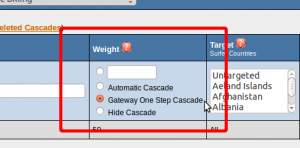Origination and Version History
As of version 4.0.74.1, NATS4 supports a one page Gateway Setup. This allows surfers to bypass the NATS pre-join page, instead combining the required information onto a single gateway join page that surfers can register on. This article describes how to set up this feature, as well as how it works.
Setting up in NATS
Site Template
In order to use the Gateway One Step Join feature, you must first customize the corresponding template. You can do this by editing the new site template -- gateway_onestep_join where you can configure your one page setup.
To find your gateway_onestep_join template, go to the Sites Admin and click the "Edit Site Templates" icon of the Site you would like to add the Gateway One Step Join option to. Find gateway_onestep_join in your list of site templates, and click the "Customize" icon to make changes to your template. After you have configured the template to your wishes, click "Save Template."
Make sure you have made the appropriate modification to this template before putting this setup live on your system.
Cascade Setup

Selecting "Gateway One Step Cascade" to set the weight
In order for NATS to recognize a cascade as a gateway one step cascade, you will need to set a special Cascade Weight. To set this weight, go to the Billers Admin and find the cascade you wish to use, or create a new one. Once you have chosen a cascade to use, click the pencil icon to edit this cascade. On the next page (Cascade Settings), you will have to edit the "Weight" setting. Under weight settings you can either select "Gateway One Step Cascade" or set the weight to "258"-- both choices will allow NATS to recognize that cascade as a Gateway One Step Cascade. Remember your Cascade ID number, located on the left hand side of your cascade in the ID column, as you will need it for a future step.
Next, add your preferred billers to the cascade you have just edited or created by clicking the magnifying glass icon (Show Cascade Steps). Add the billers you would like to use by choosing them from the "Add Cascade Step" drop-down menu.
Note: The first biller in a cascade of this type MUST be a gateway. If anything other than a gateway is used, the surfer will be redirected back to your regular pre-join page.
Query String Setup
In order for NATS to know that you want to use the Gateway One Step Process, you will need to specify your one step cascade number in your query string. For example, if your Cascade ID is 3 (your gateway one step cascade number), you will have to change your default NATS join link from the example below:
http://joinow.toomuchmedia.com/signup/signup.php?nats=<?=$_REQUEST['nats']?$_REQUEST['nats']:'MC4wLjEuMS4wLjAuMC4wLjA'?>&step=2
You can modify this URL to include your gateway one step cascade. For example:
http://joinow.toomuchmedia.com/signup/signup.php?nats=<?=$_REQUEST['nats']?$_REQUEST['nats']:'MC4wLjEuMS4wLjAuMC4wLjA'?>&cascade=3
This allows the surfer to bypass the NATS pre-join page entirely, and view a combination of the pre-join and gateway join pages. From here, the join process should continue as any normal gateway join would.
